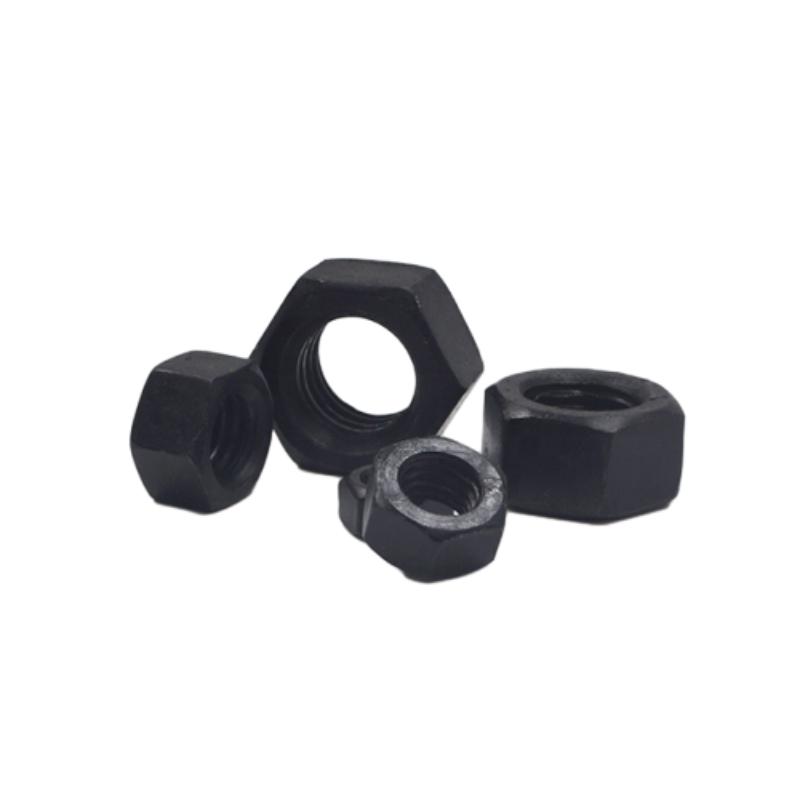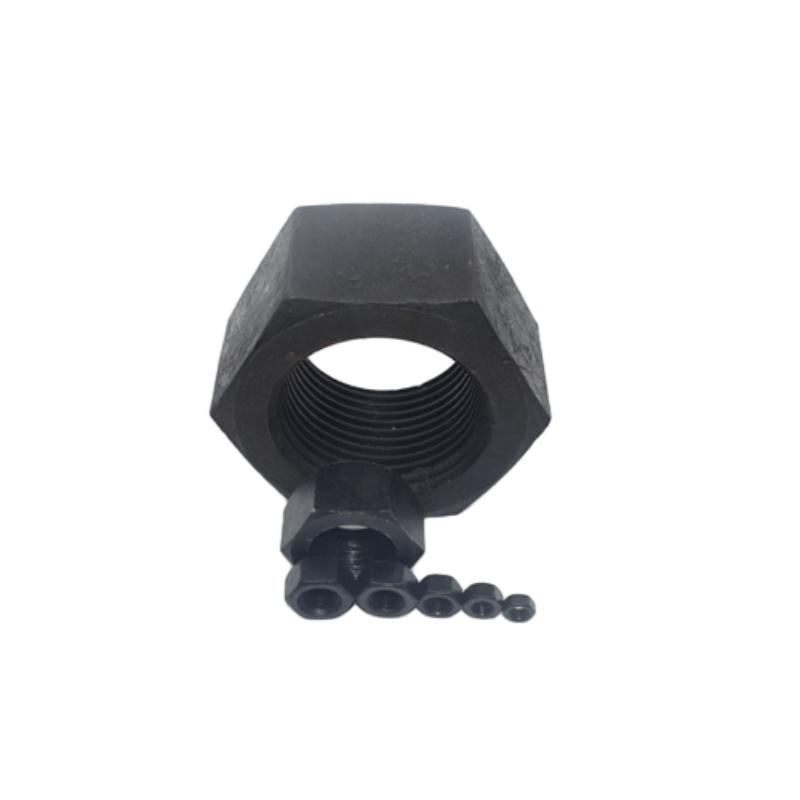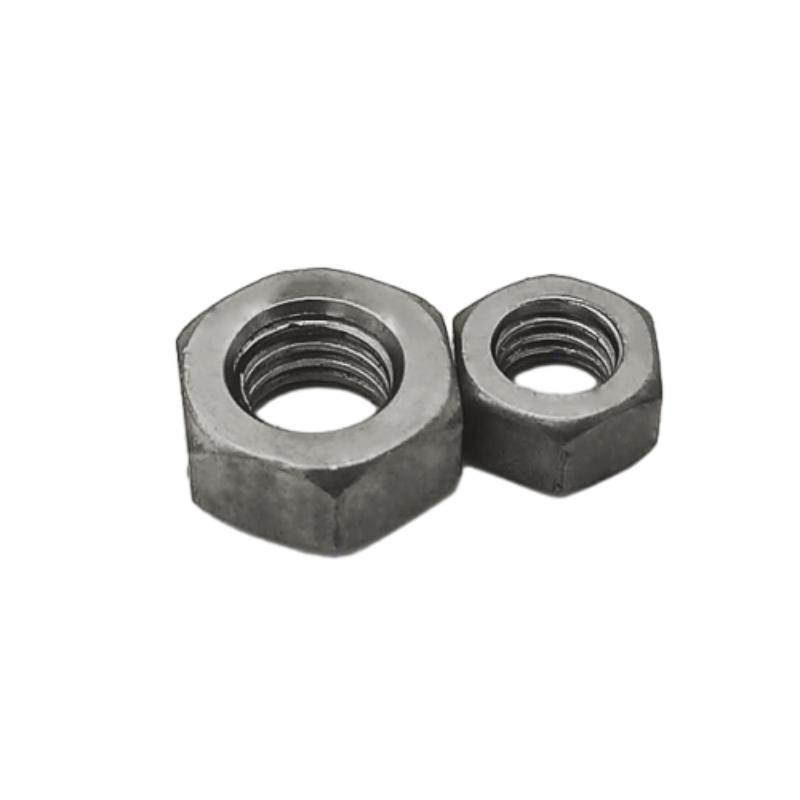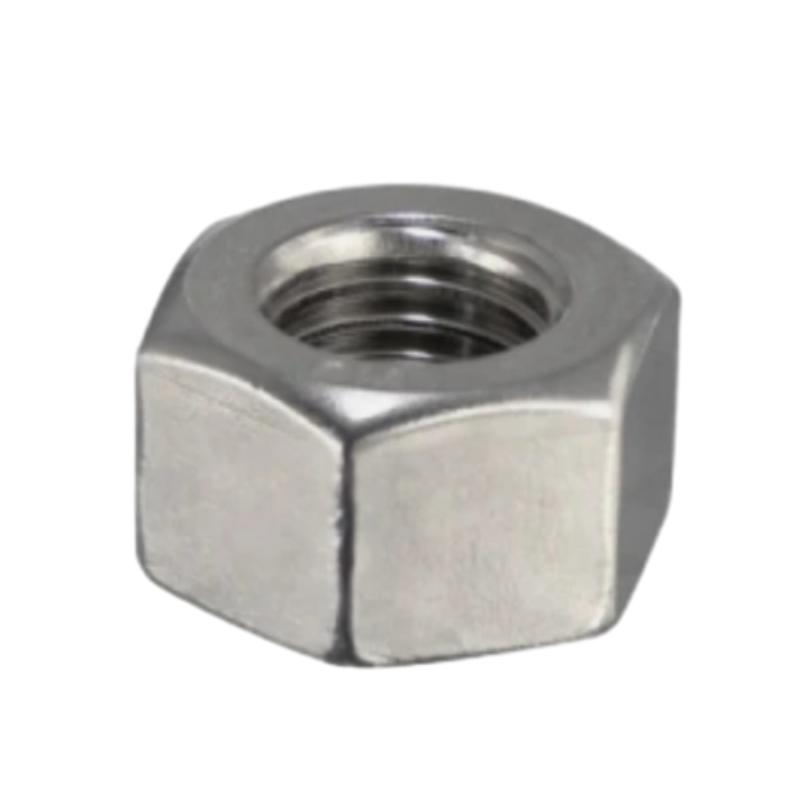Aug. . 29, 2025 03:20 Zurück zur Liste
Hex Nuts: All Sizes, Dimensions & Nylock Options
Understanding Hex Nuts: Essential Fasteners for Industrial Integrity
In the realm of industrial fastening, the hex nut stands as a ubiquitous and indispensable component, celebrated for its simple yet robust design and exceptional versatility. These six-sided fasteners are engineered to be tightened with a wrench, creating a secure joint when used in conjunction with a bolt, screw, or threaded rod. Our focus here delves into the technical intricacies, manufacturing excellence, and strategic applications of these critical components, particularly emphasizing high-performance carbon steel variants like the DIN934 Grade 4.8/8.8/10.9 Zinc/Plain/HDG M8-M20 Hex Nut. This article provides a comprehensive overview for B2B decision-makers and engineers seeking optimal fastening solutions that ensure structural integrity and operational longevity across diverse industrial landscapes.
Manufacturing Process: Precision Engineering for Robust Fasteners
The production of a high-quality hex nut is a meticulously controlled process, blending advanced metallurgy with precision engineering. Our DIN934 carbon steel hex nuts undergo a rigorous manufacturing sequence to ensure superior performance and consistency.
1. Material Selection
High-grade carbon steel rods are selected based on the required mechanical properties. For our DIN934 hex nuts, grades such as 4.8, 8.8, and 10.9 are critical, offering specific tensile strength and yield point characteristics to meet diverse application demands. This adherence to material standards is fundamental to the nut's integrity.
2. Cold Forging
The selected steel rods are cut to length and then cold-forged into the distinctive hexagonal shape. This process improves the material's grain structure, enhancing strength and fatigue resistance without requiring subsequent heat treatment for shaping. Cold forging also ensures precise hex nut dimension consistency.
3. Tapping and Threading
Following forging, the central bore of the hex nut is precisely tapped to create internal threads. This step is critical for ensuring proper engagement with mating bolts and maintaining specific hex nut sizes and metric nut sizes (e.g., M8, M10, M12 nut size, M20 nut size). Advanced CNC machining ensures thread accuracy and consistency, complying with ISO standards.
4. Heat Treatment (for Grade 8.8/10.9)
For higher-strength grades like 8.8 and 10.9, the nuts undergo a controlled heat treatment process (quenching and tempering). This further refines the material's microstructure, significantly increasing hardness, tensile strength, and overall durability.
5. Surface Finishing
Depending on the application, nuts receive various surface treatments: zinc plating for corrosion resistance, plain for specific aesthetic or post-coating requirements, or hot-dip galvanizing (HDG) for superior protection in harsh environments. These coatings directly impact the service life of the fasteners.
6. Quality Control & Testing
Every batch undergoes stringent quality control, including dimensional checks, thread gauging, hardness testing, and ultimate tensile strength tests, all in accordance with international standards such as ISO 898-2 and ANSI/ASME B18.2.2. This ensures each nut meets published specifications and target service life requirements.

Target industries for these robust fasteners include petrochemical, metallurgy, energy, automotive, and water supply & drainage. The advantages in typical application scenarios are manifold, ranging from enhanced corrosion resistance with HDG coatings in marine environments to energy savings achieved through optimized assembly processes and extended fastener life, reducing maintenance overheads.
Industry Trends in Fastener Technology
The industrial fastener landscape is continually evolving, driven by demands for increased performance, sustainability, and efficiency. Key trends influencing the development and application of hexagon nuts include:
- Advanced Materials & Coatings: Beyond standard carbon steel, there's growing interest in advanced alloys and specialized coatings (e.g., ceramic-metallic, zinc-nickel) that offer superior corrosion resistance, high-temperature performance, and reduced friction, extending the operational life of the hex nuts sizes in extreme conditions.
- Lightweighting: Industries like automotive and aerospace are pushing for lighter components to improve fuel efficiency and reduce emissions. While carbon steel remains prevalent, there's research into high-strength, lighter alternatives or optimized designs that reduce material usage without compromising strength.
- Smart Fasteners: The emergence of Industry 4.0 is leading to the development of "smart" fasteners equipped with sensors to monitor preload, temperature, and vibration in real-time. While less common for standard hex nuts, this trend impacts the overall fastening assembly.
- Sustainability & Recyclability: Manufacturers are increasingly focusing on sustainable production methods, reducing waste, and ensuring fasteners are recyclable. This includes eco-friendly surface treatments and optimizing energy consumption during manufacturing.
- Increased Customization: As applications become more specialized, the demand for tailored hex nut dimension, materials, and features (e.g., custom threads, integrated washers, specific nylock hex nut features for vibration resistance) is rising.
Technical Specifications & Parameters
Precision in specification is paramount for ensuring the integrity of any bolted joint. Our DIN934 carbon steel hex nut range adheres to strict international standards, providing reliable performance across a spectrum of industrial needs. The following table details common specifications for our product line, including critical dimensions for various hex nut sizes.

DIN934 Hex Nut Specification Table (Metric)
| Nominal Thread Diameter (d) | Pitch (P) | Nut Height (m) min | Width Across Flats (s) | Width Across Corners (e) min | Approx. Weight (kg/1000 pcs) M8-8.8 |
|---|---|---|---|---|---|
| M8 (m8 nut size) | 1.25 | 6.4 | 13.0 | 14.2 | 5.0 |
| M10 | 1.5 | 8.0 | 16.0 | 17.3 | 9.8 |
| M12 (m12 nut size) | 1.75 | 9.6 | 18.0 | 19.9 | 16.9 |
| M16 | 2.0 | 12.8 | 24.0 | 26.2 | 42.2 |
| M20 (m20 nut size) | 2.5 | 16.0 | 30.0 | 32.9 | 82.0 |
These hex nuts sizes are designed to conform to DIN934 standards, ensuring interchangeability and compatibility within global engineering practices. The "Width Across Flats (s)" is crucial for tool selection and accessibility during assembly, while "Nut Height (m)" influences thread engagement and overall joint strength. For specific imperial dimensions like 1 1/8 nut dimensions, direct conversion or specialized ANSI/ASME standards would apply.
Mechanical Property Grades
- Grade 4.8: Standard strength, commonly used in general-purpose applications where high tensile strength is not the primary requirement. Offers good ductility.
- Grade 8.8: High tensile strength, heat-treated carbon steel. Ideal for structural applications, heavy machinery, and automotive components requiring significant load-bearing capacity.
- Grade 10.9: Very high tensile strength, heat-treated alloy steel. Used in critical applications demanding extreme strength and fatigue resistance, such as heavy construction and high-stress machinery.
Application Scenarios & Technical Advantages
The versatility of the hex nut allows for its extensive use across numerous sectors. Its fundamental role is to provide a secure and reliable fastening point, crucial for safety and operational efficiency.

Typical Application Areas:
- Construction & Infrastructure: Essential for steel structures, bridges, heavy machinery assembly, and foundation bolting. Grade 8.8 and 10.9 hex nuts are critical for high-load applications.
- Petrochemical & Energy: Used in pipeline systems, pressure vessels, and offshore platforms where corrosion resistance (HDG) and high-temperature performance are paramount.
- Automotive & Transportation: Fastening engine components, chassis parts, and suspension systems. Specific applications might utilize a nylock hex nut for vibration resistance.
- Manufacturing & Industrial Machinery: Assembly of industrial equipment, conveyor systems, and robotics, requiring precise hex nuts sizes and dimensions.
- Water Supply & Drainage: Securing pipes, valves, and treatment plant components, often requiring zinc-plated or HDG coatings for long-term corrosion protection in wet environments.
Technical Advantages:
The inherent design and material properties of our carbon steel DIN934 hexagon nuts offer significant advantages:
- High Strength-to-Weight Ratio: Especially with Grade 8.8 and 10.9, these nuts provide exceptional clamping force for their size, optimizing material usage.
- Versatility: Compatible with a wide range of bolts and washers, allowing for flexible design and application. The availability of various hex nut sizes ensures suitability for diverse load requirements.
- Corrosion Resistance: Zinc plating offers general protection against oxidation, while Hot-Dip Galvanizing (HDG) provides a sacrificial zinc layer for superior protection in highly corrosive environments, extending the service life of the entire assembly.
- Ease of Installation & Maintenance: The hexagonal shape allows for easy engagement with standard wrenches, facilitating efficient assembly and disassembly. This reduces labor costs and speeds up maintenance operations.
- Cost-Effectiveness: Carbon steel is an economical material, making these nuts a cost-effective solution for mass production and large-scale projects without compromising on critical performance metrics.
- Vibration Resistance: When paired with lock washers or specialized variants like a hex nylock nut, these fasteners maintain joint integrity even under dynamic loading conditions.
Vendor Comparison: Selecting a Reliable Partner
Choosing the right supplier for industrial fasteners is as crucial as the fasteners themselves. A reliable vendor delivers not just products but also expertise, consistency, and support. When evaluating suppliers for hex nuts, B2B buyers should consider:
- Quality Assurance & Certifications: Verify adherence to international standards (ISO 9001, DIN, ANSI, ASME). Look for suppliers with in-house testing facilities and robust QC protocols. Our products are manufactured to DIN934 and meet corresponding ISO mechanical property standards.
- Material Traceability: Ensure raw material origins are verifiable and that material test certificates (MTCs) are available, especially for critical applications.
- Product Range & Customization: A broad inventory of standard hex nut sizes (M8-M20, 1 1/8 nut dimensions) and the capability for customized solutions (e.g., specific coatings, non-standard dimensions) are key indicators of a versatile partner.
- Technical Support & Expertise: Access to experienced engineers who can offer guidance on fastener selection, application challenges, and material compatibility.
- Lead Times & Logistics: Evaluate a vendor's capacity for timely delivery and efficient logistics, crucial for maintaining project schedules.
- Reputation & Track Record: Longevity in the market, testimonials, and established client relationships speak volumes about a vendor's reliability and commitment to customer satisfaction. We proudly serve a diverse range of industries globally, building trust through consistent product quality and service.
Customized Solutions & Service Case Details
While standard DIN934 hex nuts meet most requirements, certain projects demand tailored solutions. We excel in providing customized hex nuts to meet precise specifications, optimizing performance for unique challenges.

Customization Capabilities:
- Material & Grade: Beyond standard carbon steel, we can source and process various alloy steels to achieve specific mechanical properties, including enhanced corrosion resistance or high-temperature stability.
- Dimensions & Threading: Production of non-standard hex nut dimension, fine-pitch threads, or specialized coarse threads, including specific metric nut sizes and even imperial equivalents if required.
- Coatings & Finishes: Application of advanced coatings such as Xylan, PTFE, or custom paint finishes for extreme chemical resistance, low friction, or specific aesthetic requirements. This also includes specialized hot-dip galvanizing for marine or highly aggressive chemical environments.
- Special Features: Manufacturing nuts with integral washers, serrations, or specific designs like a hex nylock nut for added locking capabilities.
Application Case Study: Offshore Wind Turbine Foundation
Client: Leading Offshore Energy Developer
Challenge: Securing critical structural components of an offshore wind turbine foundation required M20 nut size hex nuts capable of withstanding extreme corrosive marine environments, high cyclic loads, and providing a service life of over 25 years without failure. Standard HDG was insufficient for the highly aggressive submerged zones.
Solution: We collaborated closely with the client's engineering team to develop a customized DIN934 Grade 10.9 hexagon nut solution. The nuts were fabricated from a specialized high-strength carbon steel, followed by an enhanced multi-layer coating system. This system included a modified hot-dip galvanizing process for increased thickness and adhesion, topped with a proprietary organic barrier coating. Rigorous salt spray and cyclic corrosion tests (exceeding ISO 9227) confirmed the enhanced corrosion resistance.
Outcome: The customized hex nuts exceeded the client's performance requirements, ensuring the long-term structural integrity of the wind turbine foundation. This tailored approach not only mitigated significant long-term maintenance costs but also significantly reduced the environmental impact associated with premature fastener failure and replacement. The project demonstrated the value of deep technical collaboration and bespoke manufacturing capabilities in critical infrastructure.
Trustworthiness & Support: Our Commitment
Building long-term partnerships in the B2B sector relies on unwavering trust. We are committed to transparency, reliability, and unparalleled customer support throughout the entire lifecycle of our hex nuts and other fastening solutions.
Frequently Asked Questions (FAQ)
Q: What is the difference between Grade 4.8, 8.8, and 10.9 hex nuts?
A: These grades denote the mechanical strength of the nut. Grade 4.8 is a standard strength carbon steel, 8.8 is a high-tensile heat-treated carbon steel, and 10.9 is a very high-tensile, heat-treated alloy steel. The higher the grade, the greater the nut's proof load and tensile strength.
Q: How do I choose the correct hex nut size and coating for my application?
A: Selecting the correct hex nut dimension depends on the bolt's diameter and the load requirements of the joint. For coatings, Zinc plating is suitable for mild indoor environments, while Hot-Dip Galvanizing (HDG) offers superior corrosion resistance for outdoor or harsh environments. For specific guidance, our technical sales team is available for consultation.
Q: Can you provide custom hex nut solutions for unique projects?
A: Yes, we specialize in customized fastening solutions. We can adapt materials, mechanical properties, dimensions (e.g., specific 1 1/8 nut dimensions), and coatings to meet your exact project specifications and performance needs. Contact our engineering team to discuss your specific requirements.
Lead Time & Fulfillment
Our streamlined manufacturing processes and robust supply chain enable competitive lead times. For standard DIN934 M8-M20 hex nuts, typical lead times range from 2-4 weeks, depending on order volume and specific finishes. Custom orders may require longer, with timelines provided upon detailed project assessment. We offer flexible fulfillment options, including bulk packaging, specific kitting, and global shipping to ensure your project timelines are met.
Warranty Commitments
All our products are backed by a comprehensive warranty against manufacturing defects and material non-conformity. Our commitment reflects our confidence in the quality and durability of our hex nuts, ensuring they meet or exceed specified industry standards. Detailed warranty terms are available upon request and are provided with every order.
Customer Support
Our dedicated customer support team is available Monday through Friday to assist with inquiries, technical support, order tracking, and after-sales service. We pride ourselves on responsive and knowledgeable assistance, ensuring a seamless experience from initial inquiry to post-installation support.
Conclusion
The hex nut, though a seemingly simple component, is a cornerstone of industrial construction and mechanical assembly. Its continued evolution in material science, manufacturing precision, and application versatility underscores its critical role in ensuring the safety, durability, and efficiency of structures and machinery worldwide. By focusing on stringent quality control, offering flexible customization, and providing comprehensive technical support, we empower B2B clients to achieve optimal performance and long-term reliability in their most demanding projects. Partner with us for fastening solutions that build lasting trust and structural integrity.
References
- International Organization for Standardization (ISO). ISO 898-2: Mechanical properties of fasteners made of carbon steel and alloy steel — Part 2: Nuts with specified proof load values — Coarse thread and fine pitch thread.
- ASTM International. ASTM A563: Standard Specification for Carbon and Alloy Steel Nuts.
- The American Society of Mechanical Engineers (ASME). ASME B18.2.2: Nuts for General Applications: Machine Screw Nuts, Hex, Square, Heavy Hex, and Bent Nuts.
- DIN Deutsches Institut für Normung e. V. DIN 934: Hexagon nuts.
- "Fasteners and Corrosion." NACE International, 2023.
Dies ist der letzte Artikel
-
Hex Nuts: All Sizes, Dimensions & Nylock Options
NachrichtAug.29,2025
-
Metric Hex Bolts Dimensions: 10.9 & Stainless Steel Specs
NachrichtAug.28,2025
-
Versatile Fasteners for Secure and Smooth Finishes
NachrichtAug.27,2025
-
Threaded Rod Solutions
NachrichtAug.27,2025
-
The Unsung Heroes of Precision and Load Distribution
NachrichtAug.27,2025
-
Hex Nut Solutions
NachrichtAug.27,2025


